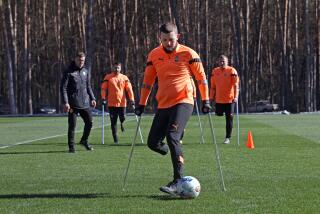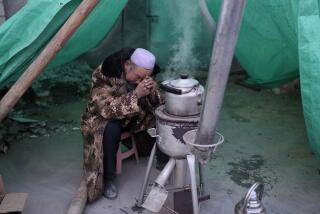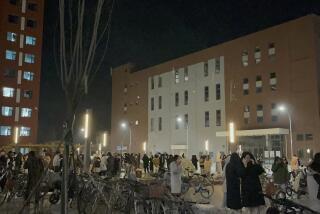Disabled quake victims face tough road
MIANYANG, CHINA — “Feifei, where are you? I’m looking for you.”
After nearly three hours of frantic searching, Zhang Qin found her 8-year-old daughter in the rubble that was once Nanba Elementary School in northern Sichuan province. Zhang dug her daughter out with her hands, removing a large beam that had pinned the little girl’s right leg.
But on the third night after the Sichuan earthquake, Zhang’s joy over her rescue was tinged with sorrow as doctors amputated Feifei’s leg several inches above the knee.
Zhang, fighting back tears, broke the news to her daughter: “Your leg isn’t there. You have to be brave. You have to live well.”
The official injury count from the deadly May 12 quake is staggering -- more than 370,000 people. Among them, 50,000 are likely to be disabled, including many with amputated limbs, according to government and health industry sources.
“I would estimate there would be thousands of amputees from the earthquake,” said Lan Xiufu, an orthopedics doctor at Chongqing Daping Hospital who has done about 100 amputation surgeries on Sichuan quake patients. He said about 30% to 40% of them were performed on children.
These victims face numerous hurdles getting rehabilitation and counseling, especially in rural areas where government programs and finances are weakest. But perhaps even more significant, they will encounter a social stigma that many of the 83 million other disabled Chinese face.
Over the last 25 years, China has established a welfare fund for the disabled and the China Rehabilitation Research Center, thanks to efforts led by the late leader Deng Xiaoping’s son, Deng Pufang, who was paralyzed during the Cultural Revolution. In 1991, China also enacted a quota system for hiring disabled people.
Still, experts say many employers remain reluctant to hire people with disabilities, preferring to pay fines rather than meet government requirements.
Negative attitudes toward the disabled abound. One recent example: An official guidebook for Chinese volunteers at the Beijing Olympics referred to physically disabled people as a “special group,” describing them as “stubborn and controlling.” (After complaints from activist groups, the commission that prepared the guide apologized for the inappropriate language.)
For disabled children, resuming their education could be a big obstacle. Very few schools in China have wheelchair and other special access for the physically impaired.
“And in the quake-hit area, especially rural parts, I’m afraid there is almost no such school there,” said Qian Zhiliang, professor with the Research Center for Special Education at Beijing Normal University.
Qian hopes that in the wake of the disaster, new schools will be designed with amputees and other disabled people in mind. But rural areas have long struggled to finance education -- one key factor in the collapse of thousands of poorly constructed schoolrooms in Sichuan that killed and injured many children.
“They have already suffered both physical and mental trauma, and we shouldn’t subject them to face trauma a third time because of the school environment,” Qian said. As it is, he added, “It’s almost inevitable that they’ll face unfriendly people in schools or in society.”
Those aren’t the only challenges the amputees will face.
Although many groups and individuals have donated money and services, and the Hong Kong-based Li Ka Shing Foundation said it would work to provide free prosthetics and wheelchairs to all quake amputees, government aid may be slow in coming.
Since China’s market reforms and the dismantling of the “iron rice bowl” and rural communes, large gaps have emerged between the social and welfare systems in rural and urban areas.
In Chinese cities, generous government health insurance and social security benefits are largely provided for individuals, including the disabled, although the amount of the support varies depending on whether one is employed.
But in rural areas, where the majority of those affected by the quake live, public health and welfare amount to a subsistence payment of less than $15 a month, said Li Yingsheng, director of the social work department at People’s University in Beijing. Some farmers participate in China’s rural cooperative health insurance, but the benefits are substantially inferior to urban plans.
“I have large worries about people in rural areas,” Li said. “When they return to their lives in their hometown, they will need psychological treatment, social services, and they’ll have problems to live on their own and find employment. Who will cover this?”
Lan, the orthopedics doctor, says that what young quake victims need most now are mental health services. On the fifth day after the quake, he went to help out at a hospital in Wenchuan, the epicenter.
“Many of the patients were trapped in rubble for hours. They were really in a panic in the darkness,” he said. Lan recalled one girl in particular who had been rescued by the People’s Liberation Army. “She used her hairpin to stab the PLA once she was freed,” he said. “Many of them are mentally very fragile and unstable.”
At Huaxi Hospital in Chengdu, Xiang Xiaolian bobbed up and down in her bed, occasionally bursting into laughter in between sentences. The 14-year-old had escaped from her school in one of the hardest-hit areas. Bandages covered her left arm and her right ear. Both hands were swollen and the skin peeling and red. Her left leg was gone.
“When I ran into the second floor, I saw someone falling,” Xiaolian said, cradling a teddy bear with one arm. “The second floor became the first floor. Then the wall fell on my left leg.” Dozens of her classmates were buried. She was rescued 10 hours later.
The teenager said she had always wanted to be a soldier. “But it turns out I’m missing a leg. How can I be a soldier?” she said.
After more than two weeks in the hospital, she said she was tired of counselors and psychologists coming around so often. “My mental health is fine,” she said. But later, she confided that she had trouble sleeping. She says she feels pain in her missing limb, a common phenomenon among amputees. She broke out in laughter and then said:
“Whenever I saw an amputee, I thought it was so pathetic. But now, I don’t feel it’s so pathetic. What’s the big deal? You get a fake leg.”
--
Cao Jun of The Times’ Shanghai Bureau contributed to this report.
More to Read
Sign up for Essential California
The most important California stories and recommendations in your inbox every morning.
You may occasionally receive promotional content from the Los Angeles Times.











